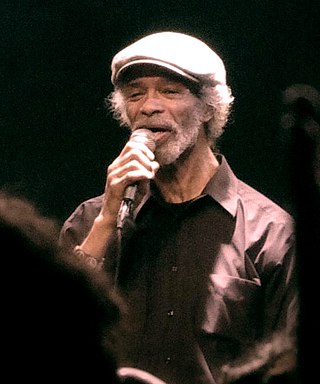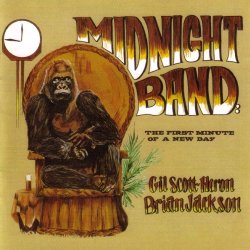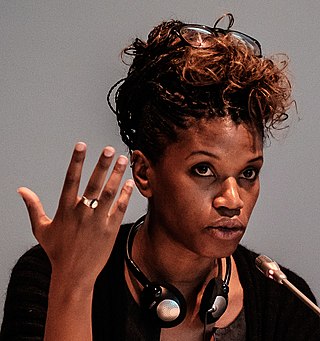See also
- Summer of Soul (...Or, When the Revolution Could Not Be Televised) , a 2021 American documentary film directed by Ahmir "Questlove" Thompson
"The Revolution Will Not Be Televised" is a poem and song by Gil Scott-Heron.
The Revolution Will Not Be Televised may also refer to:

Gilbert Scott-Heron was an American jazz poet, singer, musician, and author known for his work as a spoken-word performer in the 1970s and 1980s. His collaborative efforts with musician Brian Jackson fused jazz, blues, and soul with lyrics relative to social and political issues of the time, delivered in both rapping and melismatic vocal styles. He referred to himself as a "bluesologist", his own term for "a scientist who is concerned with the origin of the blues". His poem "The Revolution Will Not Be Televised", delivered over a jazz-soul beat, is considered a major influence on hip hop music.
"The Revolution Will Not Be Televised" is a satirical poem and song by Gil Scott-Heron. Scott-Heron first recorded it for his 1970 album Small Talk at 125th and Lenox, on which he recited the lyrics, accompanied by congas and bongo drums. A re-recorded version, with a full band, was the B-side to Scott-Heron's first single, "Home Is Where the Hatred Is", from his album Pieces of a Man (1971), featuring a distinctive bass-line by jazz bassist Ron Carter. It was also included on his compilation album, The Revolution Will Not Be Televised (1974). All these releases were issued on the Flying Dutchman Productions record label.
Jalaluddin Mansur Nuriddin was an American poet and musician. He was one of the founding members of The Last Poets, a group of poets and musicians that evolved in the 1960s out of the Harlem Writers Workshop in New York City.

The Revolution Will Not Be Televised, also known as Chávez: Inside the Coup, is a 2003 Irish documentary film. It focuses on events in Venezuela leading up to and during the April 2002 coup d'état attempt, which saw President Hugo Chávez removed from office for two days. With particular emphasis on the role played by Venezuela's private media, the film examines several key incidents: the protest march and subsequent violence that provided the impetus for Chávez's ousting; the opposition's formation of an interim government headed by business leader Pedro Carmona; and the Carmona administration's collapse, which paved the way for Chávez's return. The Revolution Will Not Be Televised was directed by Irish filmmakers Kim Bartley and Donnacha Ó Briain. Given direct access to Chávez, the filmmakers intended to make a fly-on-the-wall biography of the president. They spent seven months filming in Venezuela, following Chávez and his staff and interviewing ordinary citizens. As the coup unfolded on 11 April, Bartley and Ó Briain filmed on the streets of the capital, Caracas, capturing footage of protesters and the erupting violence. Later, they filmed many of the political upheavals inside Miraflores, the presidential palace.
Now and Then or Now & Then may refer to:

Malik Al Nasir in 1966, Liverpool, England is a British author and performance poet. He was born to a Welsh mother and a Guyanese father. He is the leader of the band Malik & the O.G's. Spurred by an interest in the early black footballer Andrew Watson, he began to research his family ancestry, claiming he was related to Watson.
Save the Children is a child-welfare non-profit organisations founded in London in 1919.

Pieces of a Man is the debut studio album by American poet Gil Scott-Heron. It was recorded in April 1971 at RCA Studios in New York City and released later that year by Flying Dutchman Records. The album followed Scott-Heron's debut live album Small Talk at 125th and Lenox (1970) and departed from that album's spoken word performance, instead featuring compositions in a more conventional popular song structure.

Winter in America is a studio album by American vocalist Gil Scott-Heron and keyboardist Brian Jackson. It was recorded in September to October 1973 at D&B Sound Studio in Silver Spring, Maryland and released in May 1974 by Strata-East Records. Scott-Heron and Jackson produced the album in a stripped-down fashion, relying on traditional African and R&B sounds, while Jackson's piano-based arrangements were rooted in jazz and the blues. The subject matter on Winter in America deals with the African-American community and inner city in the 1970s.

The First Minute of a New Day is an album by American vocalist Gil Scott-Heron, keyboardist Brian Jackson, and the Midnight Band—an eight-piece musical ensemble. It was released in January 1975 on Arista Records. Recording sessions for the album took place in the summer of 1974 at D&B Sound in Silver Spring, Maryland. It was the follow-up to Scott-Heron's and Jackson's critically acclaimed collaboration effort Winter in America. The First Minute of a New Day was the first album to feature "Winter in America", the title track of Scott-Heron's previous album which was not featured on its original LP release. The album was reissued on compact disc by Scott-Heron's label Rumal-Gia Records in 1998.
The Best Of Gil Scott-Heron is a 1984 compilation album by American recording artist Gil Scott-Heron, released on the Arista label.

We Almost Lost Detroit, a 1975 Reader's Digest book by John G. Fuller, presents a history of Fermi 1, America's first commercial breeder reactor, with emphasis on the 1966 partial nuclear meltdown.

The Revolution Will Not Be Televised is a compilation album by American poet Gil Scott-Heron. It was released in 1974 by Flying Dutchman Records and titled after Scott-Heron's 1971 song of the same name.

A New Black Poet - Small Talk at 125th and Lenox, also known simply as Small Talk at 125th and Lenox, is a live album and the first release of recording artist Gil Scott-Heron, released in 1970 on Flying Dutchman Records. Recording sessions for the album were originally said to have taken place live at a New York nightclub located on the corner of 125th Street and Lenox Avenue, but liner notes included in the 2012 box set The Revolution Begins: The Flying Dutchman Masters, Scott-Heron himself insists that a small audience was brought to 'the studio' and seated on 'folding chairs'. By the time of the recordings, Scott-Heron had published a volume of poetry and his first novel, The Vulture. Well received by music critics who found Scott-Heron's material imaginative, Small Talk at 125th and Lenox has been described as "a volcanic upheaval of intellectualism and social critique" by AllMusic editor John Bush.

Malik & the O.G's is a spoken-word performance band based in Liverpool. Its founder Malik Al Nasir put the band together in 2006 when he first recorded his poetry to music for his debut album Rhythms of the Diaspora Vol 1 & 2, which was released in on Mentis Records featuring Gil Scott-Heron and The Last Poets′ Jalal Mansur Nuriddin. Malik produced the album in 2006 and Malik & the O.G's produced a video with Emmy Award-winning Director Mitchell Stuart for the song from the album Africa, an adaptation of one of the poems of the same name in Malik's book Ordinary Guy.

Secrets is a 1978 studio album by American vocalist Gil Scott-Heron and keyboardist Brian Jackson.

Nothing New is a posthumous album of vocal & piano recordings by Gil Scott-Heron released by XL Recordings on April 19, 2014 in conjunction with Record Store Day. The album consists of new, stripped-down versions of a selection of older Scott-Heron songs stretching from 1971's "Pieces of a Man" to 1994's "The Other Side". It was recorded with producer Richard Russell between 2005 and 2009, in the same sessions that led to 2010's I'm New Here.

Rama Thiaw is a Senegalese filmmaker and screenwriter. She is known for her 2009 documentary Boul Fallé, la Voie de la lutte and her most recent documentary The Revolution Won’t be Televised (2016).
"Whitey on the Moon" is a spoken word poem by Gil Scott-Heron, released as the ninth track on his debut album Small Talk at 125th and Lenox in 1970. Accompanied by conga drums, Scott-Heron's narrative tells of medical debt, high taxes, and urban decay experienced at the time of the Apollo Moon landings, critiquing the resources spent on the space program instead of economic aid for Black Americans. "Whitey on the Moon" was prominently featured in the 2018 film First Man and the second episode of HBO's television series Lovecraft Country. "Whitey on the Moon" received renewed interest in 2021 following spaceflights by billionaires Jeff Bezos and Richard Branson, which were seen as emblematic of the inequities highlighted by the poem.

Seabrook 1977 is a 1978 American documentary film directed and produced by Robbie Leppzer and Phyllis Joffe. The film chronicles the anti-nuclear protests organized by the Clamshell Alliance against the construction of the Seabrook Station Nuclear Power Plant in Seabrook, New Hampshire, in 1977; over 2,000 protesters occupied the construction site, and 1,414 were arrested and jailed in National Guard armories for two weeks.